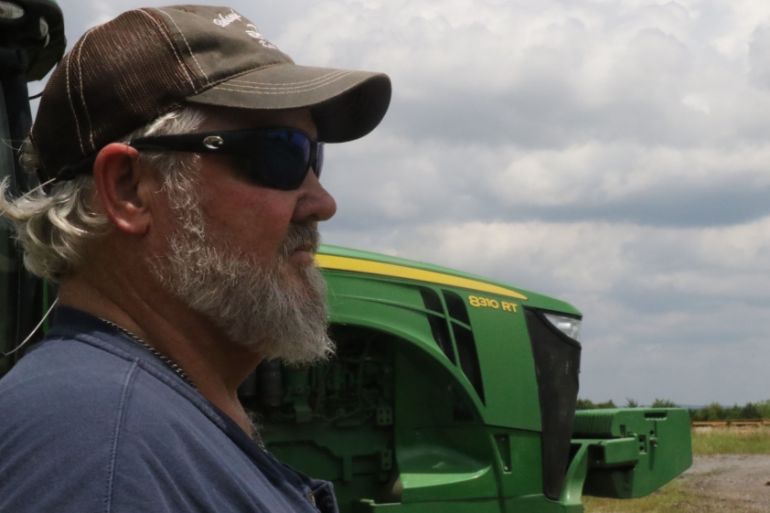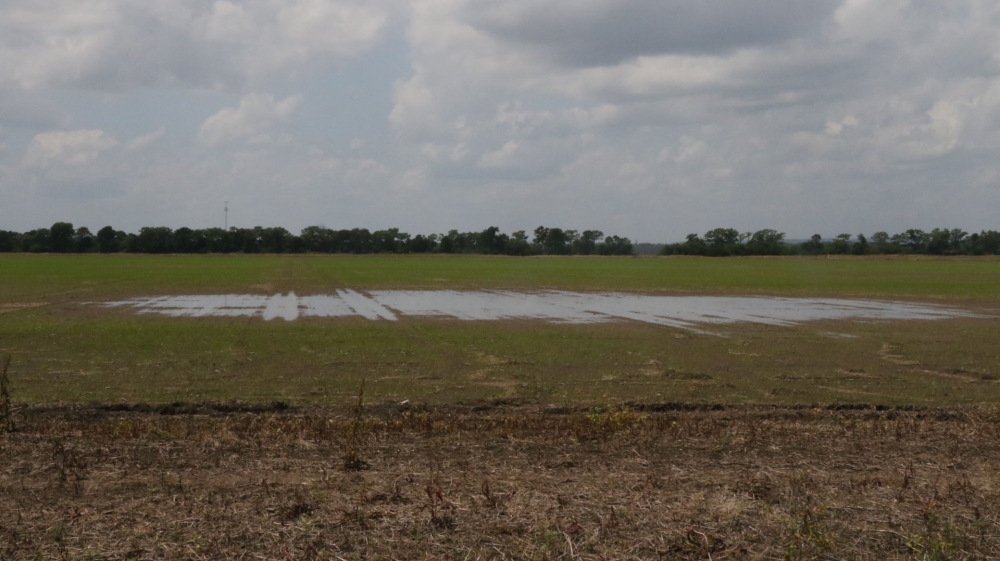‘A lot of us lose sleep’: US farmers reel as trade war drags on
As the US-China trade war approaches the one-year mark, farmers question how much longer they can hang on.

Jonesboro, United States – Rich Hillman has faced trying times before. A farmer in the southern state of Arkansas, Hillman has tilled the land for three decades, enduring the aftermath of the 1980s farm crisis, unfavourable weather patterns and previous tariffs to grow soya beans, rice and wheat.
Difficult as those challenges were, they’ve been eclipsed by the fallout of the ongoing trade war between the United States and China.
Keep reading
list of 4 itemsPolitics and convenience drive Mexico to be US’s top trading partner
Will Xi and Biden mend US-China relations at the APEC summit?
UK warns of Russia laying ‘sea mines’ to deter Black Sea cargo ships
“A lot of us lose sleep,” Hillman told Al Jazeera.
Hillman, 56, also serves as vice president of the Arkansas Farm Bureau. He talks of the “quiet disaster” he and other farmers are experiencing this year as record rainfall and floods disrupt crop planting, compounding the financial pain inflicted by the escalating US-China trade dispute.
Punitive levies specifically aimed at Chinese goods were first imposed by the administration of US President Donald Trump nearly a year ago. China has retaliated with tariffs on US goods, including more than 300 agricultural products valued at approximately $3bn in 2017.
“I can tell you that the stress level for the American farmer and rancher is probably at an all-time high, certainly in my career,” said Hillman. “The American farmer right now is really sacrificing.”
The gloom is reflected in the latest Ag Economy Barometer, a monthly, nationwide survey of 400 US agricultural producers conducted by Purdue University and CME Group.
When asked whether they felt the trade dispute with China would ultimately be resolved in a way that benefits US agriculture, some 65 percent of respondents in May said they expected a favourable outcome for the US. That’s down from March, when 77 percent expected a beneficial outcome.

‘A fast-moving wheel on a slow-moving train’
The May Ag Economy Barometer survey was conducted before the US Department of Agriculture announced it would provide up to $16bn in programmes to assist agricultural producers negatively impacted by the trade war.
But some farmers who received help under the Trump administration’s first $12bn emergency-relief package, which was announced in July 2018, have yet to recoup all their losses.
Robert Stobaugh, an Arkansas soya bean farmer, told Al Jazeera that while last year’s programme certainly helped, it hasn’t made up the entire difference.
“Starting in June last year, the anxiety level for any row-crop producer has been pretty high,” he said.
Like many American soya bean producers, Stobaugh farms with family. He, his brother and his nephew have grown the property that his father purchased in 1951 into a 6,000-acre operation in northwest Arkansas.
He invited Al Jazeera to his farm near the Arkansas River, which has broken decades-old flooding records this year.
Stobaugh delayed planting many of his crops because of the constant rain this season. The trade war has made that blow all the more difficult to absorb.
“We started with the announcement of the tariffs of China in the mid-part of the year, and [the rains came] in August, and [the fields] haven’t dried out since,” he said.
While many agricultural sectors have suffered as the trade war drags on, the soya bean industry has been especially hard hit.
Seven years ago, prices for soya beans across the US were a robust $17 a bushel – enough, says Worth, to entice new people to grow them.
Since then, prices have gone down, dropping dramatically this past year due to Chinese tariffs. Last month, soya beans fell below $8 a bushel – a record 10-year low.
“We’re mitigating losses right now,” said Stobaugh. “There’s absolutely no opportunity for us to maximise profits in this environment. A lot of the inputs, we purchased in the fall. So you have your money tied up in that, [and] the suppliers don’t want you to return those products, because they’ve also sold those things to everybody else. They don’t want them back. It’s a fast-moving wheel on a slow-moving train.”
For Stobaugh, it’s not only the lost income that bites, but the loss of an overseas market that took farming associations years to cultivate.
“We just got our feelings hurt by the way that this has been handled, because we have spent so much time off the farm, cultivating these markets across the world, China being the biggest one,” said Stobaugh.

Against the grain
Other farmers with whom Al Jazeera spoke say relief aid has managed to help them thus far. But they question how much longer they can hang on.
“If we had not gotten that [aid], I would say 25 percent of the farmers would be gone, would not be able to financially go into another year of farming,” Bob Worth, a corn and soya bean farmer in upstate Minnesota, told Al Jazeera.
“Farmers have had to refinance their land. They’ve had to maybe sell their machinery. The tariffs have really hurt us, and that is probably gonna be the final straw.”
By final straw, Worth means quitting farming.
“Either voluntarily or the bankers or lenders are gonna tell them pay your loans back and go find another job,” said Worth. “This is getting serious.”
And though the Trump administration is helping farmers weather the trade storm, accepting aid goes against the grain of some.
“I will tell you that farmers are very proud people, and we don’t like to take the disaster payments,” said Hill. “It’s a necessity right now because things are out of our control. We’d much rather get our income and feed our families with a fair market.”
But he accepts that financial help has become a geopolitical reality for US farmers.
“When we’re in a global economy, we’re not competing with the farmers in other nations,” said Hill. “We’re competing with other governments. That makes some of these facilitation payments necessary.”
And while US and Chinese leaders remain locked in a trade war, farmers across the US try to remain resilient as they move with the seasons and sow their crops.
“Farmers are always optimistic. They’re always saying, ‘Oh, it’s gonna be better,'” said Worth. “We’re always hoping that something will get resolved for the next harvest season so we can move forward.”